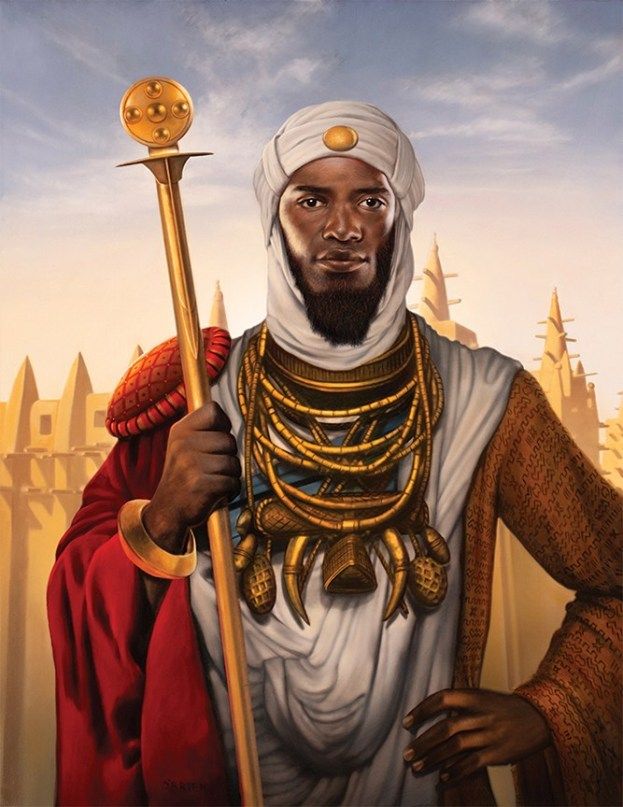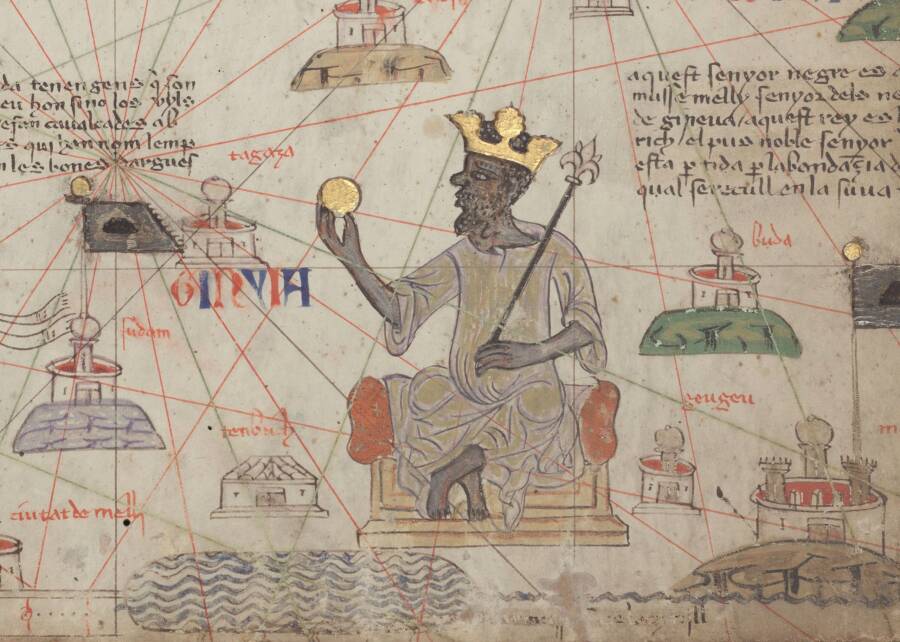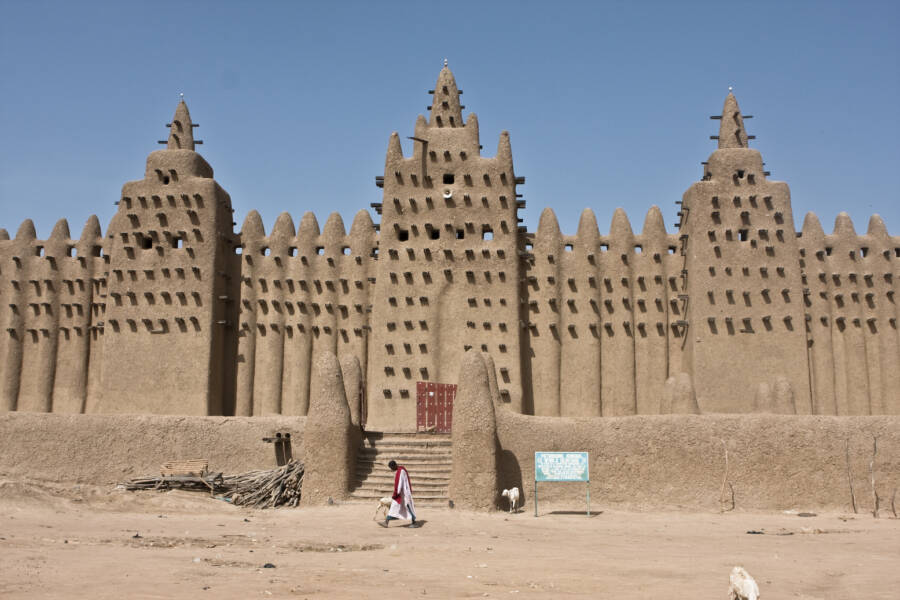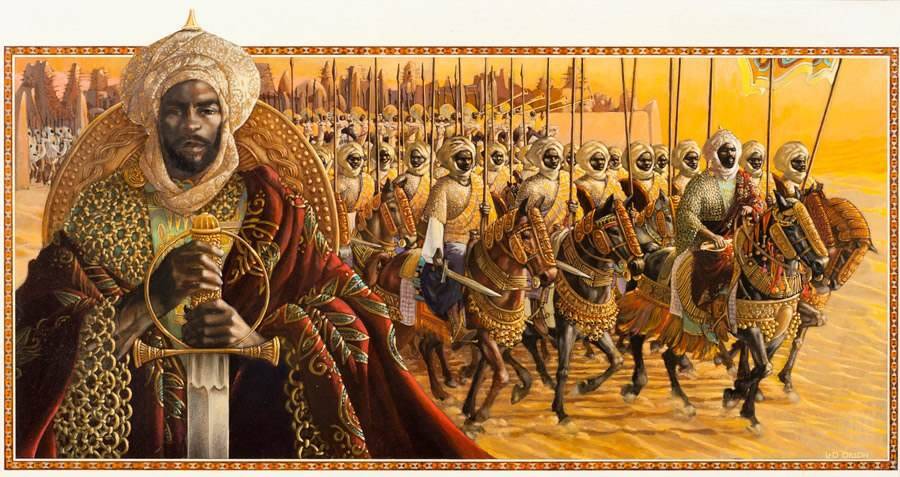When the world speaks about the richest men in history, Mansa Musa isn’t the name that usually comes to mind. You’ll usually hear household names like Bill Gates, Elon Musk, Jeff Bezos, and Warren Buffet.
But long before these men or their forefathers accumulated wealth, there lived an African King that was the richest human on earth.
In fact, it is estimated that Mansa Musa’s present-day net worth would be $400 billion. To put that into perspective, Elon Musk, who is currently the richest man in the world, is only worth about half of that.
Mansa Musa ruled Mali. Although it was such a long time ago, one would expect Mali to at least be one of Africa’s richest countries today. After all, regions like Sparta and Rome still enjoy the benefits of their forefathers’ conquests.
But alas, Mali is among the world’s poorest nations. And lately, it doesn’t look like the country ever had any trace of wealth.
However, Mali was once the most powerful country in Africa under Mansa Musa. Here we will detail the story of Mansa Musa, the height of his power, and his downfall.

Who Was Mansa Musa?
Mansa Musa was the ninth Mansa of the Mali Empire who lived circa 1312 – 1337. According to history, he was the richest man on earth. History has it that his wealth came from the mining of substantial gold and salt deposits in the Mali Empire. He also engaged in the slave and ivory trade.
Musa is Arabic for ‘Moses’, while Mansa means ‘Ruler’ or ‘King’ in Mandé, which was used as the title of the ruler of the Mali Empire. It also translates to ‘conqueror’ and ‘priest-king’.
In oral tradition and the Timbuktu Chronicles, Musa was known as Kanku Musa. It was common in Mandé tradition for one’s name to begin with their mother’s name. Therefore, Kanku Musa means “Musa, the son of Kanku”. He was also referred to as Hidji Mansa Musa in reference to his hajj.
Mansa Musa was believed to have had riches that surpassed that of any other richest men before and after him. He amassed so much wealth that reportedly crippled a nation’s economy just by his financial recklessness. He was also said to be so rich that he could give out expensive gold lavishly without regret or consequence. While there are estimates of his modern-day net worth, historians say Mansa Musa’s wealth was truly incalculable.
He was formerly known as Musa Keita before taking up the Mansa title. His great uncle, Sundiata Keita (also spelled Sunjata), founded the Mali Empire. Sundiata Keita established the capital city, Niani, during his reign.
His grandson Mansa Musa built mosques and citadels of learning in his empire (including Timbuktu). He made sure they were the epicenter of Islamic teaching. History recorded that his reign brought growth to the Mali Empire due to building projects that attracted several visitors.
At the point of Musa’s accession, Mali’s territory was made up of what had once been the Ghana Empire, which Mali conquered. It also spanned various present-day countries, such as Guinea, Senegal, Mauritania, Burkina Faso, Niger, Gambia, Chad, and Mali. But that wasn’t enough. The African ruler eventually added the cities of Timbuktu and Gao to his already large empire.
Mansa Musa’s Lineage and Accession To The Throne
Musa’s father, Faga Laye, was the son of Abu Bakr, the brother of Sundiata, the first Mansa. Although Mansa Musa’s exact date of birth is unknown, he still appeared as a young man in 1324. According to the claims of Tarikh al-fattash, Mansa Musa accidentally killed Kanku, his own mother, before his hajj.
Mansa Musa presumably ascended the throne in the early 1300s (under unclear circumstances). According to Musa, his predecessor, Muhammed Ibn Qu, launched two expeditions to explore the Atlantic Ocean. This included 200 ships for the first exploratory mission and 2,000 ships for the second time. He appointed Musa as his assistant to rule the empire until he returned from his second expedition. When he didn’t return, Musa became the Mansa. So, his accession marked a transfer of the royal line from the Sunjata’s descendants to Abu Bakr’s.
However, some modern historians have claimed Musa’s version of the story might be false, stating that he may have devised the story to cover up the true events of how he took over power.
Mansa Musa gathered his wealth during this period, extending the shores of the empire alongside amassing great wealth and riches. Gold, copper, and salt were major sources of income in the 12th century, and since it wasn’t a luxury in the Mali Empire, Musa exploited them and became wealthy.
According to the Tarikh al-Fattash record, Musa had a wife named Inari Konte.
Read: The Fascinating Life of Herbert Macaulay, a Nigerian Nationalist
Mansa Musa’s Pilgrimage To Mecca
Mansa Musa was a Muslim, and his pilgrimage to Mecca contributed to his fame across Northern Africa and the Middle East. It seemed like he desperately wanted to do hajj, so he planned the trip for years.

When Musa left Mali for hajj, he left his son Muhammad to rule in his absence and he made his pilgrimage circa 1324 and 1325, spanning 2,700 miles. Reportedly, his procession included 60,000 men wearing brocade and Persian silk. In addition, he had 12,000 slaves who carried 1.8 kg (4 Ib) of gold bars each, plus heralds dressed in silks who carried gold staffs, organized horses, and handled bags.
On this journey, Mansa Musa provided all necessities for the procession; he fed the company of men and animals. 80 camels carried 23-136 kg (50-300 Ib) of gold dust.
Being a generous man, Musa gave the gold to the poor he met on his way. Also, he gave to cities he passed on his way to Mecca, including Cairo and Medina. There, he also traded gold for souvenirs.
In some historical accounts, Mansa Musa built a mosque every Friday. Al-Umari had referred to this act as “a lavish display of power, wealth, and unprecedented by its size and pageantry”. In other words, Mansa Musa made sure to make a point of his wealth.
However, Mansa Musa built the Djinguereber Mosque, which still stands today.

In 1324, Mansa Musa and his entourage arrived at the outskirts of Cairo, and they camped for three days by the Pyramids of Giza before finally crossing the Nile into Cairo on the 19th of July. While still in Cairo, Musa met with the Mamluk sultan, al-Nasir Muhammad.
Mansa Musa stayed in the Qarafa district of Cairo and became friends with its governor, Ibn Amir Hajib, who learned a lot about Mali from him. After staying for about three months, he departed with the official caravan to Mecca.
As he continued on his journey and till his arrival, he explored more of his generosity, giving out gifts to other pilgrims and the indigenes of Medina and Mecca. While in Mecca, a conflict broke out between Malian pilgrims and a group of Turkic pilgrims in the Masjid al-Haram. The conflict required men to draw out their swords, but Musa persuaded his men to back down before the situation worsened.
After the events, he and his entourage stayed back in Mecca after the last day of the hajj.
Mansa Musa’s Financial Woes
While returning home, traveling separately from the main caravan, a catastrophe befell them on their way to Cairo. On arrival at Suez, several of the Malian pilgrims had died of cold, starvation, bandit raids, and loss of supplies.

Unfortunately, Musa had run out of money, and he had to borrow and re-sell some of their purchases while in Cairo. This led to Musa going into debt, owing several merchants such as Siraj al-Din. However, Al-Nasir Muhammad returned the favor of Musa’s show of generosity with gifts.
While traveling, Musa met the Andalusian poet Abu Ishaq al-Sahili. Charmed by his eloquence and knowledge of jurisprudence, he convinced him to travel with him to Mali. Mansa Musa also took several other scholars, such as Maliki Jurists, with him to Mali.
Gao and Timbuktu, according to the Tarikh al-Sudan, surrendered to Musa’s reign while he was traveling back to Mali. According to one of Ibn Khaldun’s accounts, Musa’s general Saghmanja defeated Gao. In another account, Mansa Sakra conquered Gao. Both of these stories could be accurate because Mali’s hold over Gao might have been weak and required frequent assertions of power by the strong Mansas.
The Death of Mansa Musa
But according to Ibn Khaldun, Musa also sent a representative to congratulate Abu al-hassan Ali on taking control of Tlemcen in 1337. Yet, Musa had already passed away and Suleyman had assumed the throne when Abu al-Hasan dispatched an ambassador in response. As a result, Musa might have passed away around 1337.
Al-Umari in his account twelve years after Musa’s hajj, or around 1337, claimed that Musa returned to Mali planning to abdicate and return to reside in Mecca. But he died before he could do so, implying that he passed away even earlier than 1332.
It’s likely that Maghan, Musa’s son, was the one to congratulate Abu al-Hasa. Or he was the one to welcome the envoy of Abu al-Hasan after Musa passed away.
Before you go…
Thank you for reading this blog. We hope you loved it. But before you go, we would like you to know about our team at Nicholas Idoko Technologies. We help small, medium, and large-scale businesses lead competitive markets through modern applications. We can create custom software applications that suit your visions. Some of our past projects cut across blockchain, eCommerce, online voting, games, fintech, and Edtech.
We Design & Develop Websites, Android & iOS Apps
Looking to transform your digital presence? We specialize in creating stunning websites and powerful mobile apps for Android and iOS. Let us bring your vision to life with innovative, tailored solutions!
Get Started TodayWe will provide the best software products with the fastest delivery time. Contact us today for a consultation and any of our services.
Put Your Tech Company on the Map!
Get featured on Nicholas Idoko’s Blog for just $200. Showcase your business, boost credibility, and reach a growing audience eager for tech solutions.
Publish Now










